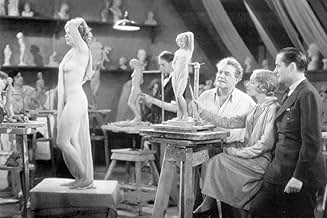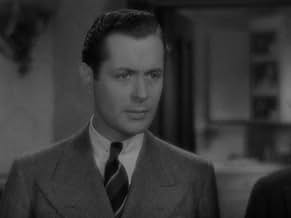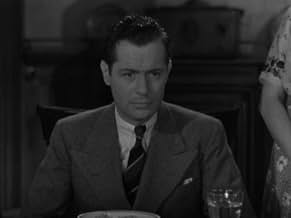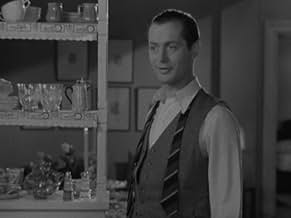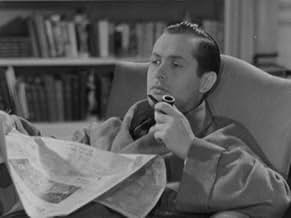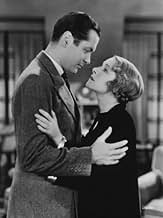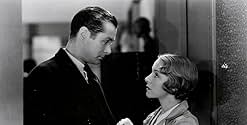A new bride learns she and her husband's stuck-up family don't speak the same language.A new bride learns she and her husband's stuck-up family don't speak the same language.A new bride learns she and her husband's stuck-up family don't speak the same language.
- Awards
- 3 wins total
Julia Bejarano
- Umbrella Peddler
- (uncredited)
William Farnum
- C. Forrester
- (uncredited)
Sherry Hall
- Purser
- (uncredited)
6.4455
1
2
3
4
5
6
7
8
9
10
Featured reviews
"Another Language" gets lost in its translation from stage to screen
There's a good film hiding within "Another Language," but it's overshadowed by an overwrought plot and, most significantly, an unsympathetic central character.
The plot concerns Stella (Helen Hayes), a newlywed whose husband Victor (Robert Montgomery) is blind to his family's boorish behavior and their immediate dislike of his new bride. Worst in the bunch is his smothering mother (Louise Closser Hale), whose reaction in every scene is to pretend to be ill to gain her sons' sympathy. Why none of her stupid children see through her manipulative behavior boggles the mind. Victor (or as his family annoyingly calls him, Vicki) is the most frustrating character in the film. He takes his family's side whenever a conflict arises and treats his wife not only like a stranger, but with disdain. It's a mystery as to what Stella ever saw in him and for that matter, why she hasn't walked out on him. There's also a subplot involving Victor's nephew who falls in love with Stella that is never fully developed, nor is it resolved to a satisfying conclusion.
Another weakness, as someone else pointed out, is that the one family member who shows any compassion toward Stella is Victor's father (Henry Travers), yet he never stands up to his wife or any of the other relatives who are always attacking Stella.
Hayes is acceptable in her role, but it's easy to see why she never became a successful film star. Whatever magic she had on stage doesn't translate to the screen. Her acting is sometimes mannered and she doesn't have a face the camera would fall in love with. She isn't helped by Montgomery, who is just so unlikeable in this film. The two have zero chemistry.
Louise Closser Hale fares better as Mrs. Hallam, the mother-in-law from hell. The standout, though, is Margaret Hamilton in her film debut as one of Stella's sisters-in-law. Though bitchy most of the time, she does show some humanity in the final reels and is the only truly believable member of the family. The movie is only worth sitting for through the performance of this consummate character actor. It's like she's speaking another language compared to the rest of the cast.
The plot concerns Stella (Helen Hayes), a newlywed whose husband Victor (Robert Montgomery) is blind to his family's boorish behavior and their immediate dislike of his new bride. Worst in the bunch is his smothering mother (Louise Closser Hale), whose reaction in every scene is to pretend to be ill to gain her sons' sympathy. Why none of her stupid children see through her manipulative behavior boggles the mind. Victor (or as his family annoyingly calls him, Vicki) is the most frustrating character in the film. He takes his family's side whenever a conflict arises and treats his wife not only like a stranger, but with disdain. It's a mystery as to what Stella ever saw in him and for that matter, why she hasn't walked out on him. There's also a subplot involving Victor's nephew who falls in love with Stella that is never fully developed, nor is it resolved to a satisfying conclusion.
Another weakness, as someone else pointed out, is that the one family member who shows any compassion toward Stella is Victor's father (Henry Travers), yet he never stands up to his wife or any of the other relatives who are always attacking Stella.
Hayes is acceptable in her role, but it's easy to see why she never became a successful film star. Whatever magic she had on stage doesn't translate to the screen. Her acting is sometimes mannered and she doesn't have a face the camera would fall in love with. She isn't helped by Montgomery, who is just so unlikeable in this film. The two have zero chemistry.
Louise Closser Hale fares better as Mrs. Hallam, the mother-in-law from hell. The standout, though, is Margaret Hamilton in her film debut as one of Stella's sisters-in-law. Though bitchy most of the time, she does show some humanity in the final reels and is the only truly believable member of the family. The movie is only worth sitting for through the performance of this consummate character actor. It's like she's speaking another language compared to the rest of the cast.
A well-written screenplay and wonderful acting make this movie a joy to watch.
Anyone interested in family relationships will surely enjoy this movie about a manipulative matriarch, Louise Closser Hale, who is not averse to fake fainting spells to get her way with her four sons and their wives. The acting is first-rate by a stellar cast, five of whom (John Beal, Hal K. Dawson, Irene Cattell, Maidel Turner and Margaret Hamilton) were in the original Broadway production which opened 25 April 1932, and who reprised their roles. This was also the film debut of Beal, Hamilton and Cattell (the only film she ever made). But kudos go to the magnificent Helen Hayes as the new addition to the family who stands up to Hale, John Beal, as her sensitive nephew who falls in love with her, and Robert Montgomery playing Hayes' husband, still under the control of his mother. I thoroughly enjoyed this movie. Stick with it until the end; the last 20 minutes are as riveting as any drama can be.
Good domestic drama from Rose Franken who wrote "Claudia"...
ANOTHER LANGUAGE is the story of a marriage that suffers because the husband (ROBERT MONTGOMERY) is a self-centered snob ruled by a family that views its mother (LOUISE CLOSSER HALE) as the matriarch of the family who must be paid attention at all costs and smothers Montgomery with motherly affection. I loved the line spoken by HENRY TRAVERS, who tells her at a crucial moment, "Shut up, ma and don't faint. He's not looking."
HELEN HAYES gives one of her more natural performances on film. Very often she was prone to stage acting techniques, but here her manner is subdued and never overplayed. Montgomery is excellent and makes the man a weakling the viewer can never really warm up to until the final moments when he stands by her side.
Rose Franken was an expert at telling stories about family relationships, as she did with "Claudia" and the sequel "Claudia and David". Here she paints a vivid portrait of unpleasant family relationships.
In strong supporting roles, MARGARET HAMILTON and JOHN BEAL repeat their stage roles effectively.
HELEN HAYES gives one of her more natural performances on film. Very often she was prone to stage acting techniques, but here her manner is subdued and never overplayed. Montgomery is excellent and makes the man a weakling the viewer can never really warm up to until the final moments when he stands by her side.
Rose Franken was an expert at telling stories about family relationships, as she did with "Claudia" and the sequel "Claudia and David". Here she paints a vivid portrait of unpleasant family relationships.
In strong supporting roles, MARGARET HAMILTON and JOHN BEAL repeat their stage roles effectively.
another language
Trouble with the in laws? Try spending an hour and fifteen minutes with the Hallam clan. I guarantee that they'll make your spouse's folks look delightfully eccentric. In other words, this is a wonderful study in reverse snobbery (The Hallams think their son's wife is "high hat" while it is they who act superior), casual social cruelty (the constant digs, disguised as offhand remarks, at the daughter in law's dress and manner and way of life), and sheer annoyance, from the constant stream of banal gossip to the mother in law's strategic fainting to the brother in law's stupid jokes and even lamer pranks.
So, great social satire that, in the hands of two of 1930 and 40s Hollywood's best scribes, Herman Mankewiecz and Donald O Stewart, at times rivals Sinclair Lewis or Kaufman/Hart. And the performances aint bad, either. Especially good are Louise Closser Hale as the long suffering (and doesn't she let you know it!) matriarch of the Hallams, Henry Travers as her weak but much nicer husband, Margaret Hamilton as the wasp tongued, faintly sympathetic sister in law and Hal K Dawson as the brother in law you'd love to punch (surprised it didn't happen). As the married couple who must put up with the above Robert Montgomery and Helen Hayes are fine, especially Hayes in one of her more restrained acting turns. The only performance that strikes me as wooden or clunky is that of John Beal as the rebellious, artistic nephew, but then he is given the flattest of Mank and Stewart's otherwise sharp dialogue. Biggest weakness in the film, though, is neither the writing nor the acting but director Edward Griffith's inability to seem to have any idea that there is such a thing as visual comedy. (i.e. Film's fairly stiff/stagey). Give it a B.
So, great social satire that, in the hands of two of 1930 and 40s Hollywood's best scribes, Herman Mankewiecz and Donald O Stewart, at times rivals Sinclair Lewis or Kaufman/Hart. And the performances aint bad, either. Especially good are Louise Closser Hale as the long suffering (and doesn't she let you know it!) matriarch of the Hallams, Henry Travers as her weak but much nicer husband, Margaret Hamilton as the wasp tongued, faintly sympathetic sister in law and Hal K Dawson as the brother in law you'd love to punch (surprised it didn't happen). As the married couple who must put up with the above Robert Montgomery and Helen Hayes are fine, especially Hayes in one of her more restrained acting turns. The only performance that strikes me as wooden or clunky is that of John Beal as the rebellious, artistic nephew, but then he is given the flattest of Mank and Stewart's otherwise sharp dialogue. Biggest weakness in the film, though, is neither the writing nor the acting but director Edward Griffith's inability to seem to have any idea that there is such a thing as visual comedy. (i.e. Film's fairly stiff/stagey). Give it a B.
Entertaining pre-Code fare
A young couple who've eloped (Robert Montgomery and Helen Hayes) return to New York and begin spending time with his family - his parents, two brothers and their wives, and his nephew. It slowly turns into a nightmare for her, because the mother is manipulative of her son, the sisters-in-law mix in cutting remarks with their pleasantries, and one of the brothers-in-law is an immature bore (one of the things he does is surprise women by running his hand along their back and making a slide whistle sound).
Her marriage begins to deteriorate because her husband sides with his family in their assessment that she's "high hatting" them. While it's true that she's more worldly and refined, she doesn't look down her nose at them at all, and in reality suffers from their barbs at the weekly get togethers. Enter the nephew (John Beal), who is also a bit of an outcast in the family, because he's interested in things like architecture and travel. He soon develops feelings for his aunt that go beyond normal affection, but despite her own unhappiness, she reminds him of how inappropriate it is.
You might divine that this is a pre-Code film because it deals with the incestual love a nephew has for his aunt, which, even if it isn't by blood, is obviously a taboo subject, or maybe because of a scene with a female model in the background of a sculpting class draped with thin sheer fabric. Despite how salacious it sounds (or how production stills show the model from the side, close-up and almost entirely nude), it feels pre-Code mostly because of how honest it is. There is such a realistic portrayal of the family's passive aggressiveness here that it's very frustrating and claustrophobic, and the script has a tight, very modern feel to it, particularly in the ensemble scenes.
I love Margaret Hamilton in this as one of the sister-in-laws, and Helen Hayes is as radiant as ever. Louise Closser Hale is great as the mother too, even if the character is irritating, and it's notable that it was her last film, as she would die at 60 two days before the film was released. It zips along at 77 minutes, never lagging, and while I wish it had ended a little differently, it made for a satisfying watch.
Her marriage begins to deteriorate because her husband sides with his family in their assessment that she's "high hatting" them. While it's true that she's more worldly and refined, she doesn't look down her nose at them at all, and in reality suffers from their barbs at the weekly get togethers. Enter the nephew (John Beal), who is also a bit of an outcast in the family, because he's interested in things like architecture and travel. He soon develops feelings for his aunt that go beyond normal affection, but despite her own unhappiness, she reminds him of how inappropriate it is.
You might divine that this is a pre-Code film because it deals with the incestual love a nephew has for his aunt, which, even if it isn't by blood, is obviously a taboo subject, or maybe because of a scene with a female model in the background of a sculpting class draped with thin sheer fabric. Despite how salacious it sounds (or how production stills show the model from the side, close-up and almost entirely nude), it feels pre-Code mostly because of how honest it is. There is such a realistic portrayal of the family's passive aggressiveness here that it's very frustrating and claustrophobic, and the script has a tight, very modern feel to it, particularly in the ensemble scenes.
I love Margaret Hamilton in this as one of the sister-in-laws, and Helen Hayes is as radiant as ever. Louise Closser Hale is great as the mother too, even if the character is irritating, and it's notable that it was her last film, as she would die at 60 two days before the film was released. It zips along at 77 minutes, never lagging, and while I wish it had ended a little differently, it made for a satisfying watch.
Did you know
- TriviaModern sources state that Helen Hayes replaced Norma Shearer in the lead after Shearer decided to stay at home and nurse her husband, Irving Thalberg, who had suffered a serious heart attack.
- GoofsWhen Sally is pouring coffee for Victor, she gets distracted and spills some - it splashes out of the saucer and onto the tablecloth. However, in the next shot where she switches cups with Victor, there is no evidence of the spilled coffee on the tablecloth.
- Quotes
Mother Hallam: [Victor has left the house against his mother's wishes] Victor! Come back here!
[she swoons]
Pop Hallam: Don't bother to faint, Mom, he can't see you.
Mother Hallam: [suddenly alert, and very irritated] Shut up!
- Crazy creditsIn the beginning credits portraits of the actors who portray the main characters are shown with a hand flipping through a photo album of the Hallam Family.
- ConnectionsFeatured in This Side of Heaven (1934)
- SoundtracksThe Wedding of the Painted Doll
(uncredited)
Music by Nacio Herb Brown
Lyrics by Arthur Freed
Played on the Victrola
Details
Box office
- Budget
- $272,297 (estimated)
- Runtime
- 1h 17m(77 min)
- Color
- Aspect ratio
- 1.37 : 1
Contribute to this page
Suggest an edit or add missing content

